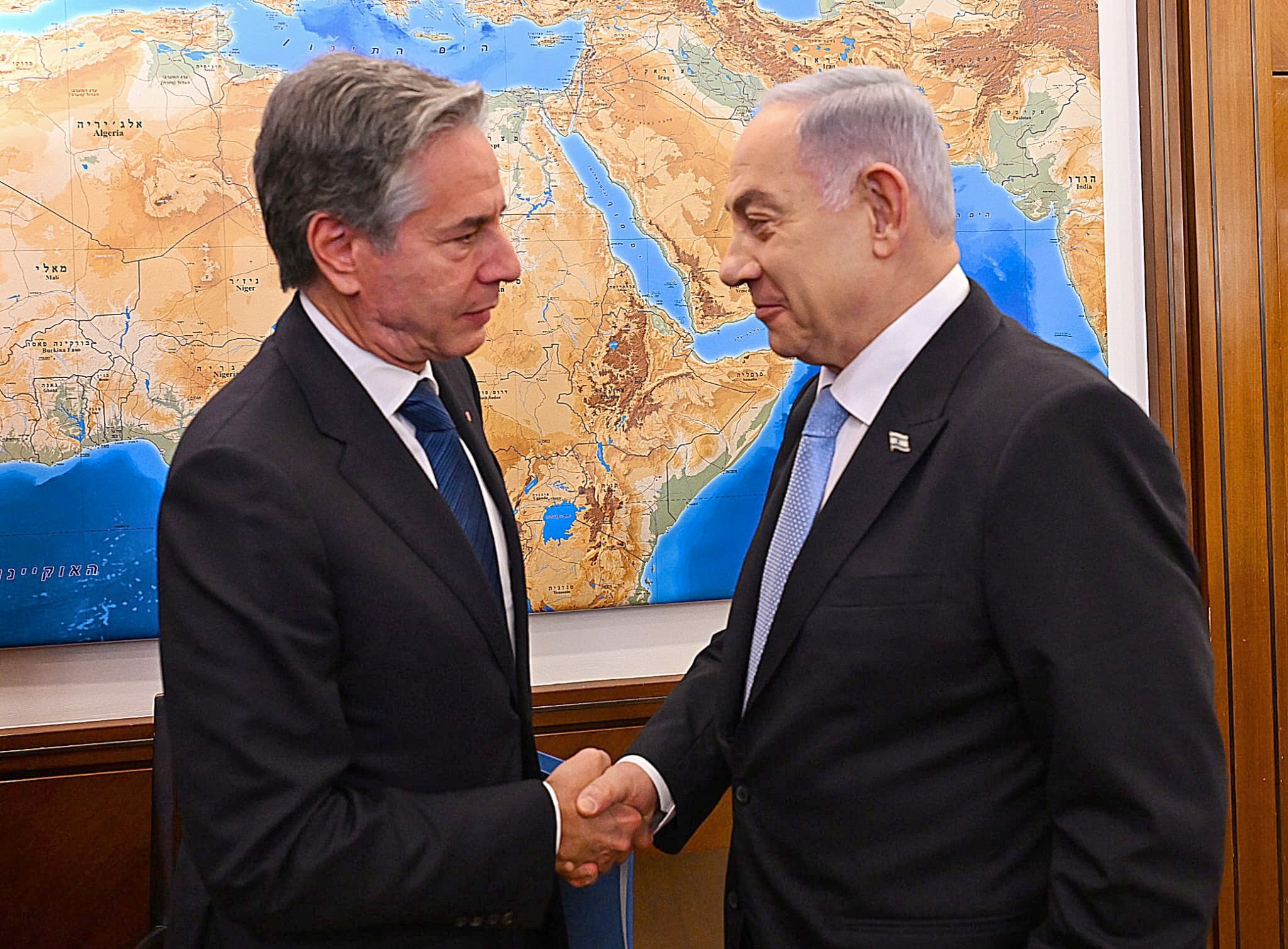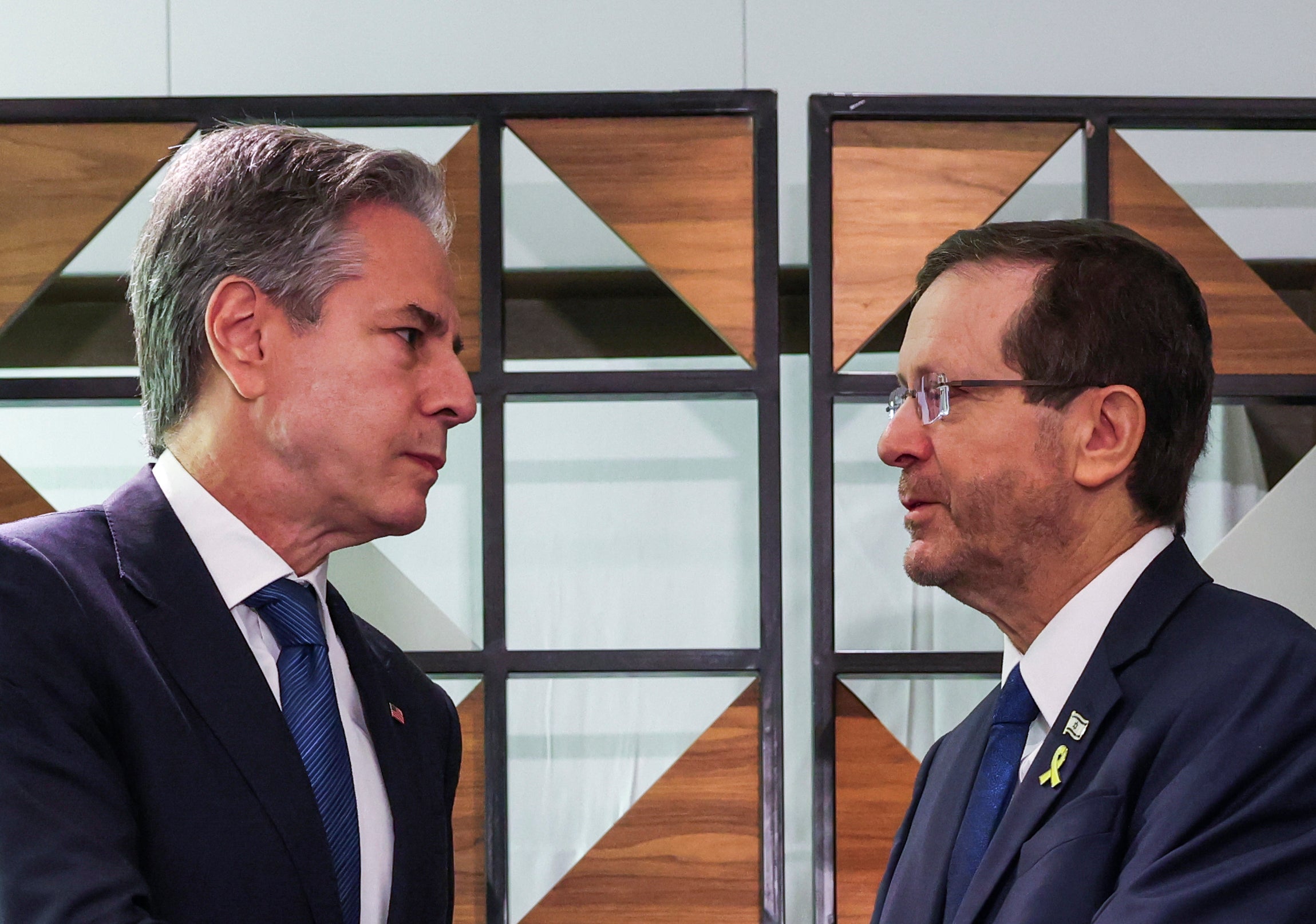Israel accepts US ‘bridging proposal’ for Gaza ceasefire deal, Blinken says
US secretary of state has warned latest talks may be last opportunity to secure release of hostages

Your support helps us to tell the story
From reproductive rights to climate change to Big Tech, The Independent is on the ground when the story is developing. Whether it's investigating the financials of Elon Musk's pro-Trump PAC or producing our latest documentary, 'The A Word', which shines a light on the American women fighting for reproductive rights, we know how important it is to parse out the facts from the messaging.
At such a critical moment in US history, we need reporters on the ground. Your donation allows us to keep sending journalists to speak to both sides of the story.
The Independent is trusted by Americans across the entire political spectrum. And unlike many other quality news outlets, we choose not to lock Americans out of our reporting and analysis with paywalls. We believe quality journalism should be available to everyone, paid for by those who can afford it.
Your support makes all the difference.The US secretary of state Antony Blinken says Israeli prime minister Benjamin Netanyahu has accepted a “bridging proposal” for a ceasefire deal in Gaza,
Mr Blinken said a two-and-a-half hour meeting with Mr Netanyahu in Tel Aviv on Monday had been “very constructive” and urged Hamas to also accept the proposals.
He had warned earlier in the day that the latest Gaza ceasefire talks are “maybe the last opportunity” to secure a hostage release and truce agreement and are a “decisive moment”.
The talks in Qatar, also involving Egypt, paused at the end of last week without a breakthrough, with Hamas casting doubt on the prospects of a deal, but have resumed this week based on what Washington has called a “bridging proposal”.
Mr Blinken told reporters in Tel Aviv: “In a very constructive meeting with prime minister Netanyahu today, he confirmed to me that Israel accepts the bridging proposal, that he supports it.”

“It’s now incumbent on Hamas to do the same, and then the parties, with the help of the mediators – the United States, Egypt and Qatar – have to come together and complete the process of reaching clear understandings about how they’ll implement the commitments that they’ve made under this agreement.”
On his ninth trip to the region since the start of the war in Gaza, Mr Blinken has already talked to Israel’s leaders, seeking to get Mr Netanyahu to sign off on a deal. Mr Netanyahu’s office said the three-hour meeting was “held in a good atmosphere” and that Israel backed Washington’s proposal. The secretary of state also met with Israeli president Isaac Herzog.
Hamas has accused Mr Netanyahu of “thwarting the mediators’ efforts”, and Turkey said after meeting Hamas envoys that Gaza’s ruling group had told it that US officials were “painting an overly optimistic picture” of the talks. Mr Netanyahu told Israel’s cabinet on Sunday that “we are conducting negotiations and not a scenario in which we just give and give”, suggesting that all the optimistic talk may not yet be reflected in the ceasefire talks themselves.
However, a US official, when asked by Reuters if the Hamas comments amounted to a rejection of the deal, responded that Washington believes the bridging proposal it outlined last week addresses various concerns and would iron out difficult implementation aspects.
The war in Gaza was triggered by a Hamas attack inside southern Israel on 7 October during which around 1,000 people were killed and another 250 were taken hostage, according to Israeli figures. Of those, some 110 are still believed to be in Gaza, though Israeli authorities say around a third are dead. More than 100 hostages were released in November during a weeklong ceasefire.
In response to the Hamas attack, Israel has launched an air and ground offensive and a blockade, which health officials in Gaza say has killed more than 40,000 people and devastated the besieged strip, forcing the majority of Gaza’s 2.3 million residents out of their homes.
The main UN agency in Gaza, UNRWA, said on Monday that 207 of its staff had been killed since the war began. “They were engineers, teachers, medical staff. They were humanitarian workers,” it said in a statement.
Speaking in Tel Aviv before meeting Mr Herzog, Mr Blinken said he was also working to de-escalate other regional tensions fuelled by the war in Gaza.
The US diplomat described the current moment as “probably the best, maybe the last opportunity to get the hostages home, to get a ceasefire and to put everyone on a better path to enduring peace and security”.

He said Mr Biden had sent him “to get this agreement to the line and ultimately over the line”.
The Gaza conflict has put the entire Middle East region on edge, triggering months of border clashes between Israel and Lebanon’s Iran-backed Hezbollah movement, and threatening a wider escalation involving major powers.
Tensions have been further stoked by the assassination of Hamas leader Ismail Haniyeh on Iranian soil late last month, which Tehran has blamed on Israel, vowing revenge. Possible retaliation from Hezbollah – with Israel having killed a senior Hezbollah commander in Beirut a few hours before Haniyeh was assassinated – is also contributing to the growing concerns over a wider war.
Mr Blinken acknowledged that it was a “fraught moment” for Israel, where there are concerns about potential attacks by Iran and Hezbollah. He said: “We’re working to make sure that there is no escalation, that there are no provocations, that there are no actions that in any way move us away from getting this deal over the line, or for that matter, escalating the conflict to other places and to greater intensity.”
The evolving multi-phase truce deal has several main principles, including Hamas releasing all hostages abducted during its 7 October attack and Israel withdrawing its forces from Gaza and releasing Palestinians held in its jails.
Hamas accuses Israel of adding new demands, such as maintaining a military presence along the Gaza-Egypt border to prevent arms smuggling and along a line bisecting the territory so it can search Palestinians returning to their homes in the north. Israel said those were not new demands but clarifications of a previous proposal.
Officials said the US has presented proposals to bridge all the gaps remaining between the Israeli and Hamas positions. Formal responses to the US outline are expected this week and could lead to a ceasefire declaration, unless the talks collapse, as has happened with a number of previous efforts.
Mr Blinken is due to visit Egypt on Tuesday.
Join our commenting forum
Join thought-provoking conversations, follow other Independent readers and see their replies
Comments